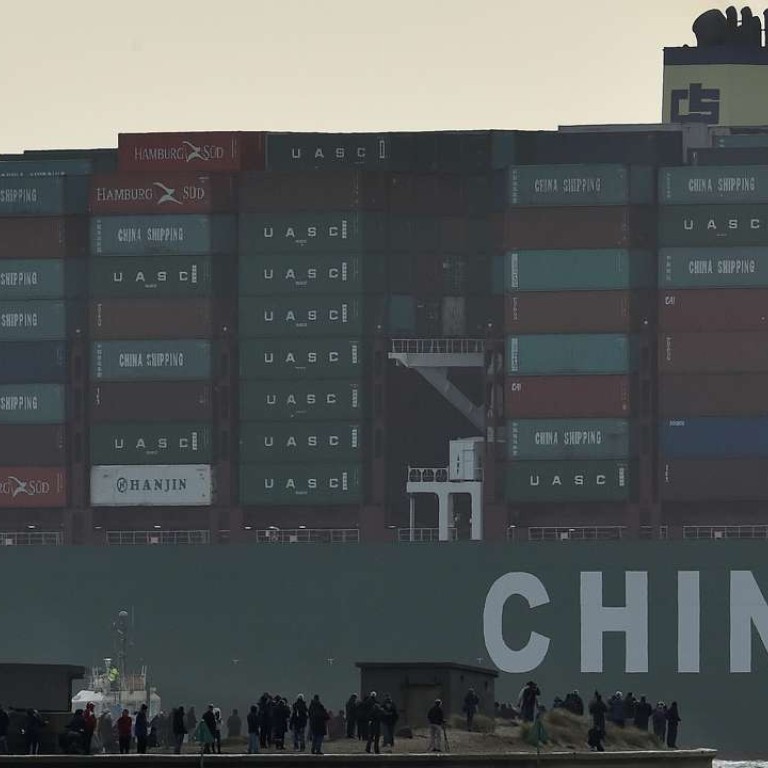
Relaxed mainland port rules could slice 14pc off Hong Kong’s container throughput, says report
City could lose all transshipment rights in the non-Pearl River Delta region, meaning a loss of 2.4 million containers per year
A full relaxation in the mainland’s laws prohibiting foreign-flagged vessels from moving cargo from one mainland coastal port to another, could deal a serious blow to Hong Kong’s container freight industry, according to the highly influential Hang Seng Management College (HSMC).
It claims in a new report that in the worst-case scenario, Hong Kong could lose all transshipment rights in the non-Pearl River Delta region, which could translate into a loss of 2.4 million container twenty-foot equivalent units (TEU) – a measurement of standard container sizes – which would mean a 14 per cent loss of the city’s annual total container throughput.
China’s rules were waived for Hong Kong as was considered a foreign port for these purposes.
The relaxation of the transportation rules, commonly called cabotage in the industry, started in 2013. Up until then Hong Kong was seen as the most convenient place for foreign ships to transit goods into Asia, but the new rules now provides them a lot more choice.

China also launched the Shanghai Pilot Free Trade Zone in 2013, and has gradually relaxed the cabotage restrictions within the zone since, meaning foreign-flagged but Chinese-owned ships can now engage in domestic shipping.
Meanwhile, coastal ports such as Qingdao, Ningbo and Guangzhou have been lobbying hard for a relaxation of their own cabotage rules on foreign vessels.
At the same time, the Nansha Free Trade Zone in Guangdong province, is progressively introducing measures to promote transshipment trade.
“Mainland China’s cabotage relaxation is weakening Hong Kong’s status of being a key transshipment hub in the region, and creating uncertainty for the local jobs market and economy,” warned Lawrence Leung, dean of HSMC’s school of decision sciences.
“Any further relaxation will very likely lead to vicious competition among coastal ports such as Shenzhen, Ningbo and Shanghai and the business of Chinese-owned shipping companies will unavoidably suffer.”
Before 2013, only vessels hoisting Chinese flags were allowed to conduct coastal shipping of cargo between Chinese mainland ports, according to Chinese Maritime law.
In other words, a US-registered ship, for instance, having loaded cargo in Shanghai could not immediately unload that cargo in Shenzhen.

However, China’s relaxation of the rules means Hong Kong’s status of being a transit hub is shrinking.
Hong Kong’s container port ranked number fifth globally, according to 2015 throughput, but Leung now fears it will drop to ninth place in the foreseeable future.
In the fifteen years to 2015, container throughput increased from 17.8 million to 20 million, while Shenzhen increased five-fold, from 5 million to 24 million during the same period.
The slowing growth, he said, will not only hurt Hong Kong’s status, but also its economy and social stability.
“The local economy stands to suffer with the continued decline in Hong Kong’s throughput,” said Collin Wong, head of HSMC’s department of supply chain and information management.
“The struggling freight industry will be hard hit, particularly, with many job losses expected.”
The HSMC study shows there were 765,000 workers engaged in the Hong Kong trading and logistics sector, accounting for a fifth of the city’s total employment, and generating a quarter of the city’s GDP.
The port and logistics sector employed 92,000.
In the waks of the changed in China’s cabotage laws, HSMC is calling on the Hong Kong government to proactively adopt a set of concrete measures to support the continued growth of the logistics industry.
“These measures would include the upgrade of its port infrastructure, establishing policies and laws favourable to maritime trade, and expanding the terminal capacity,” Wong said.
“Collaboration between Hong Kong and the mainland should be strengthened to promote win-win scenarios for both Hong Kong and Chinese coastal ports.”
Industry participants, in said, should also be encouraged to upgrade their facilities and services, added Eugene Wong, an assistant professor at the same department.
“Single-window operation would improve efficiency, and cut the current time into a half if the system successfully implemented.”
Single window systems enable international traders to submit the necessary, such as import and export permits, at a single location or single entity.
The Hong Kong government issued a consultation paper to seek views on the development of a Trade Single Window earlier this year, and plans to set up a Single Window information technology platform for the one-stop lodging of all 51 business-to-government documents for all trade declaration and customs clearance purposes.

